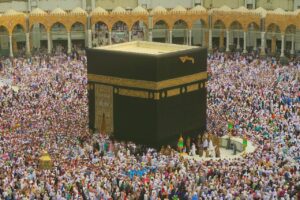
In the previous Article we looked at the different conditions by which a person is allowed not to fast during Ramadaan. This leniency and ease is only with the mercy and the kindness of Allah. Fasting, however is an important part of Islam. A person who is excused (for a valid reason) from fasting during Ramadaan has to make up for it after Ramadaan.
Ulama Institute #1
Looking to learn Arabic or memorize the Quran?
Check our Trusted Teachers

With regard to making up for missed or broken fasting of Ramadaan, there are two important terms; qada and fidyah.
Qadaa: When a person is excused from fasting in Ramadaan he or she is not permanently exempted from the missed fast. This means that at some stage the person would have to make up for that fast. This fast is called the gadaa fast of Ramadaan. For every fast missed or broken, one gadaa fast becomes obligatory. The gadaa fast becomes obligatory as soon as the reason for not fasting has been removed. It should be made up for as soon as possible. At least, a person should ensure that the fast is made up for before the following Ramadaan. The gadaa fast cannot be made up for in Ramadaan.
Fidyah: Some people are excused from fasting during Ramadaan for a valid reason that is of a permanent nature. This would mean that the condition that allowed the person not to fast is expected to continue indefinitely. Such a person would not have to make qadaa for the missed days of fast. He/she would have to feed a poor person for a day in compensation for each missed day, and this is known as fidyah.
In the previous lesson, certain groups or classifications of the people given permission to miss the fast of Ramadaan were listed. What then is the ruling regarding making up for the missed fasting for each of these groups?
The Traveler
Qadaa becomes obligatory as soon as he/she is not longer considered to be a traveler.
The Sick
a) When the person recovers, qadaa becomes obligatory.
b) If the person’s illness is incurable, then fidyah becomes obligatory.
The elderly
If the person is old and weak and is not expected to regain enough strength to fast then he/she will give fidyah.
The Pregnant and the breast-feeding woman
Once she is able to fast, qadaa becomes obligatory.
Menstruation
Once a woman is out of the specific condition, qadaa becomes obligatory for her from that time until the next Ramadaan.
Saum (fasting) is compulsory on all Muslims.
Allah ﷻ in His infinite mercy, has facilitated all things which we perceive to be difficult. Even though Sawm is obligatory, Muslims who break their fast for valid reasons are still given the opportunity to make up for their ‘debt’ to Allah and we should be infinitely grateful to Allah ﷻ for these favors.
It must however be remembered that it is not permissible for a person to break his/her fast without a valid reason. The sin of doing this is most severe and a person can truly not compensate enough to make up for the broken fast.







